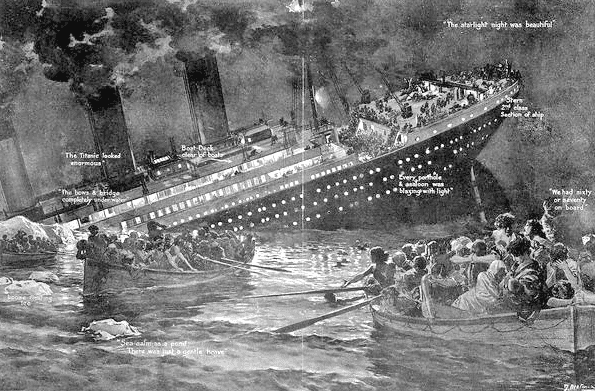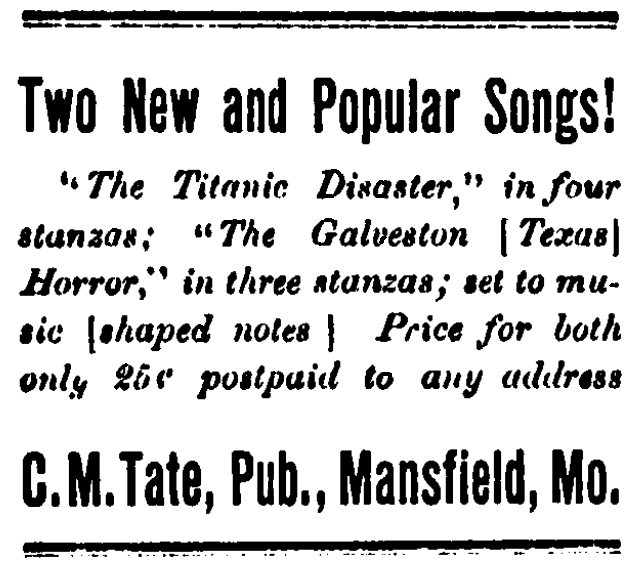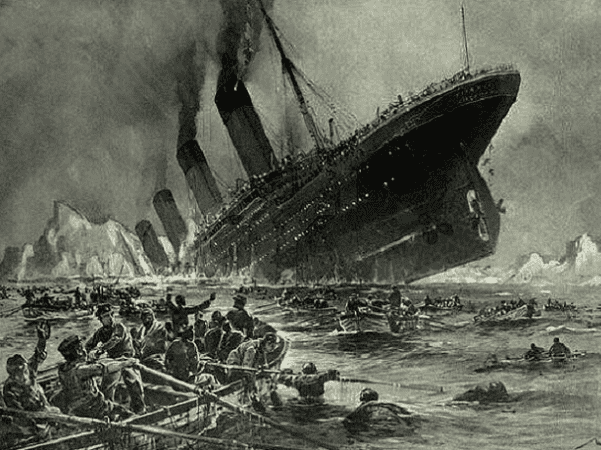Introduction: In this article, Gena Philibert-Ortega presents another way of understanding the tragedy of the sinking of the “Titanic”; sheet music written shortly after the maritime disaster. Gena is a genealogist and author of the book “From the Family Kitchen.”
What songs do you know that tell of the Titanic disaster? Music about a tragedy published right after the disaster may seem a little odd. After all, who wants to sing songs about a sinking that killed more than 1,500 people on 15 April 1912? But in reality, song writers have always used real-life events, including tragedies, as material for their songs.

In the case of the sinking of the Titanic, long before Celine Dion’s “My Heart Will Go On” was used in James Cameron’s epic movie Titanic, Americans were using the tragic ocean voyage as inspiration in film and song – starting with the first film that documented the tragedy: Saved from the Titanic, which featured actual Titanic survivor and actress, Dorothy Gibson, and premiered just 29 days after the ship’s sinking. Soon after came the publication of Titanic-focused sheet music that could be played on the piano and sung by families at home, like this example.

The Story of the Titanic, Set to Music
Yes, families could buy sheet music that focused on the Titanic. These songs provided families that had pianos the opportunity to play and sing everything from marches to ballads. In a time before electronic media, playing the piano and singing were a form of early entertainment for families, and they had a range of sheet music to choose from.
“The Wreck of the Titanic: A Descriptive March,” by John J. Thomas, is a musical re-telling of the story of the ocean liner. The sheet music doesn’t have lyrics to sing, but it provides a dramatic synopsis of the tragedy with short descriptions such as “tourists entering the ship” and “leaving port.” Its ending includes the descriptions “boilers explode,” “the death toll,” “boat sinking,” and “Carpathia coming to the rescue.”
Many of the songs about the Titanic published in the first two years after the sinking recall that the ship’s band played “Nearer, My God, to Thee” on that fateful night. That’s the subject of one of the lyrics in a song that claims to be the first song about the disaster: “Just as the Boat Went Down.” It is “Dedicated to the heroes who went down the world’s largest ship.” The cover states it’s a souvenir edition and shows a before and after image of the ship. The song proclaims:
“The band played,
Tho’ doomed to drown,
‘Nearer, My God, to Thee,’
Just as the boat went down.”
The story of this last song being played as the ship sank may just be that – a story. While it seems an appropriate hymn to play as thousands face their death, including all of the musicians, there is some debate whether “Nearer, My God, to Thee” was actually played on the sinking ship.* But the idea that it was does make for some dramatic lyrics in the music produced right after the tragedy.
Women and Children First
Questions after the sinking, and continued study of the Titanic tragedy, raise questions about the code of conduct that dictates that men should sacrifice themselves to save women and children. After the sinking, some men were villainized for allegedly not obeying this unwritten rule. On the other hand, the male passengers who stayed onboard were praised for their sacrifice.
These themes are found in the sheet music written after the sinking, especially in a song appropriately titled “My Sweetheart Went Down with the Ship,” described as a “beautiful song inspired by the wreck of the Titanic.” The second chorus and the refrain tell the story of a woman’s sweetheart who obeyed the “women and children first” code, which led to his demise:
Out in the sea, Parted from me, Down in the deep he is sleeping
Fearless and brave, His life he gave, And the angels their watch will be keeping.
[refrain]
My sweetheart went down with the ship,
Down to an ocean grave,
One of the heroes who gave his life,
The women and children to save.
The code of women and children first is also a part of the 1912 composition by Mrs. C. W. Hea entitled “Death Song of ‘The Titanic,’” whose second verse proclaims:
Save first the babes and women,
Then we will die like men.
Sheet Music in the Newspapers
Online historical sheet music databases provide digitized copies of these Titanic songs, but old newspapers – such as GenealogyBank’s Historical Newspaper Archives – also provide insight into the songs depicting the Titanic disaster through announcements and advertising. For example, this 1913 Bismarck Daily Tribune article announces that Alfred Karlson of Burleigh County, North Dakota, had penned the song “The Ill-Fated Titanic.” It is described as:
“…a beautiful song in which the fateful maiden voyage of the Titanic and the sad consequences of the awful disaster which terminated it are related in a touching and pathetic way, which awakens tender feelings of sympathy, etc., in the human heart.”
You might have done a doubletake at the idea that Titanic sheet music exists that dates to close after the tragedy, but Titanic isn’t the only disaster that influenced music right after the fact. The sinking of the Lusitania in 1915 also influenced songs, with titles like “When the Lusitania Went Down” and “As the Lusitania Went Down (He Thought of the Girl Who Loved Him; He Thought of Their Wedding Day).”
Music Adds Social History
So why does music about the Titanic matter to genealogists? A benefit of perusing online sheet music databases is that it helps us understand our ancestors’ era better. Did they own a piano? What music were they familiar with? What were their thoughts about the tragedy? What was life like for them in 1912? All important questions as we think beyond names and dates and focus on our ancestors’ lives.
* “Last Song of the Titanic,” Snopes (https://www.snopes.com/fact-check/last-song/: accessed 9 April 2020).
Related Articles:
